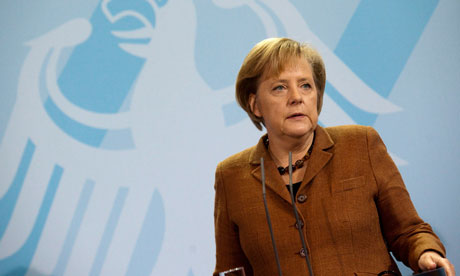
'The Muslim Brotherhood could evolve in the years to come to become the Egyptian equivalents of Germany’s Christian Democrats, whose party leader Angela Merkel is the current chancellor.' Photograph: Marcel Mettelsiefen/EPA
The Failings Of Self-Avowedly Islamic Governments In Iran, Sudan and Afghanistan Have Prompted Much Reflection
By Inayat Bunglawala
Monday 14 February 2011 12.55 GMT
Courtesy Of "The Guardian"
The question: Is Islamism dying?
When empires fall they tend not to rise up again. Harvard professorNoah Feldman observes that the same is true of government systems. The institution of the monarchy has been in general decline since the American revolution and not many people honestly expect Marx to be making a comeback any time soon. The two exceptions, Feldman points out in his book The Fall and Rise of the Islamic State, are democracy and the Islamic state.
The abolition of the Ottoman caliphate by the newly established Turkish republic in 1924 led to the creation of a number of Islamic movements in Muslim-majority countries seeking to establish justice and restore Muslim civilisation to the heights of past glories. It was during this period that the two most influential Islamic groups, the Muslim Brotherhood (1928) and the Jamaat-i-Islami (1941), were founded in Egypt and British India respectively. The programmes of both groups were – not entirely unfairly – described as "totalitarian" in scope. Indeed, Hassan al-Banna, the founder of the Muslim Brotherhood, made it clear that he believed that multi-party politics was too divisive and unsuited to his vision of an Islamic state.
Since then, the well-publicised failings of the self-avowedly Islamic governments that came to power in Iran, Sudan and Afghanistan have forced many Muslim thinkers to, well, think again. It has turned out that "good Muslims" are every bit as susceptible to monopolising and abusing power as their non-Muslim counterparts.
At the same time, the notable progress made in Turkey by the AK party working firmly within a secular democratic framework has led to new questions being asked about the relationship between Islam and the state. Add to that the first-hand experience of many tens of thousands of Islamic activists – not least in Hosni Mubarak's Egypt – with detention without trial, ruthless state repression, torture and outrageously rigged elections. This has helped to create a far greater awareness and appreciation for the centrality of human rights, constitutionalism, freedom and democracy in any conception of an "Islamic state".
The Muslim Brotherhood circa 2011 certainly cannot be described as liberal democrats, but neither are they the extremists as portrayed by some of their detractors, as even Tony Blair conceded. Its leadership now embraces a range of nuanced political outlooks, many of them mercifully rather different to that originally envisioned by Hassan al-Banna. Though they are not there yet – a draft document circulated in 2007 outlining the Muslim Brotherhood's political vision was heavily criticised for being too reactionary – it was an interesting and hopeful sign that quite a bit of that criticism came from younger members. I don't believe there is a compelling reason why the Muslim Brotherhood cannot continue to evolve in the years to come to become the Egyptian equivalents of Germany's Christian Democrats, whose party leader Angela Merkel is the current chancellor.
Just last week, David Cameron spoke of "Islamists" harbouring ''real hostility towards western democracy and liberal values," but this overlooks how people's ideas can develop and change over time. A 2007 poll organised by the University of Maryland in the US to gather views in some key Muslim-majority countries found that a majority favoured reunifying their countries under a caliphate – but more noticeably an even greater majority wanted to see democracy established in their countries. Democracy and a caliphate: but aren't they meant to be irreconcilable? Well, not necessarily, if, as some prominent Muslim thinkers including Abdulwahab el-Affendi have argued, that it is based on a European Union-type confederacy of independent democratic Muslim-majority states.
The Sudanese Muslim thinker, Abdullahi Ahmed An-Na'im argues in his book Islam and the Secular State that: "In order to be a Muslim by conviction and free choice, which is the only way one can be a Muslim, I need a secular state."
It is an argument that has admittedly not yet been won in Muslim-majority countries, but neither is it one that is fundamentally unwinnable as Muslim thinkers continue to come to terms with what an "Islamic state" should look like in the modern world.
No comments:
Post a Comment